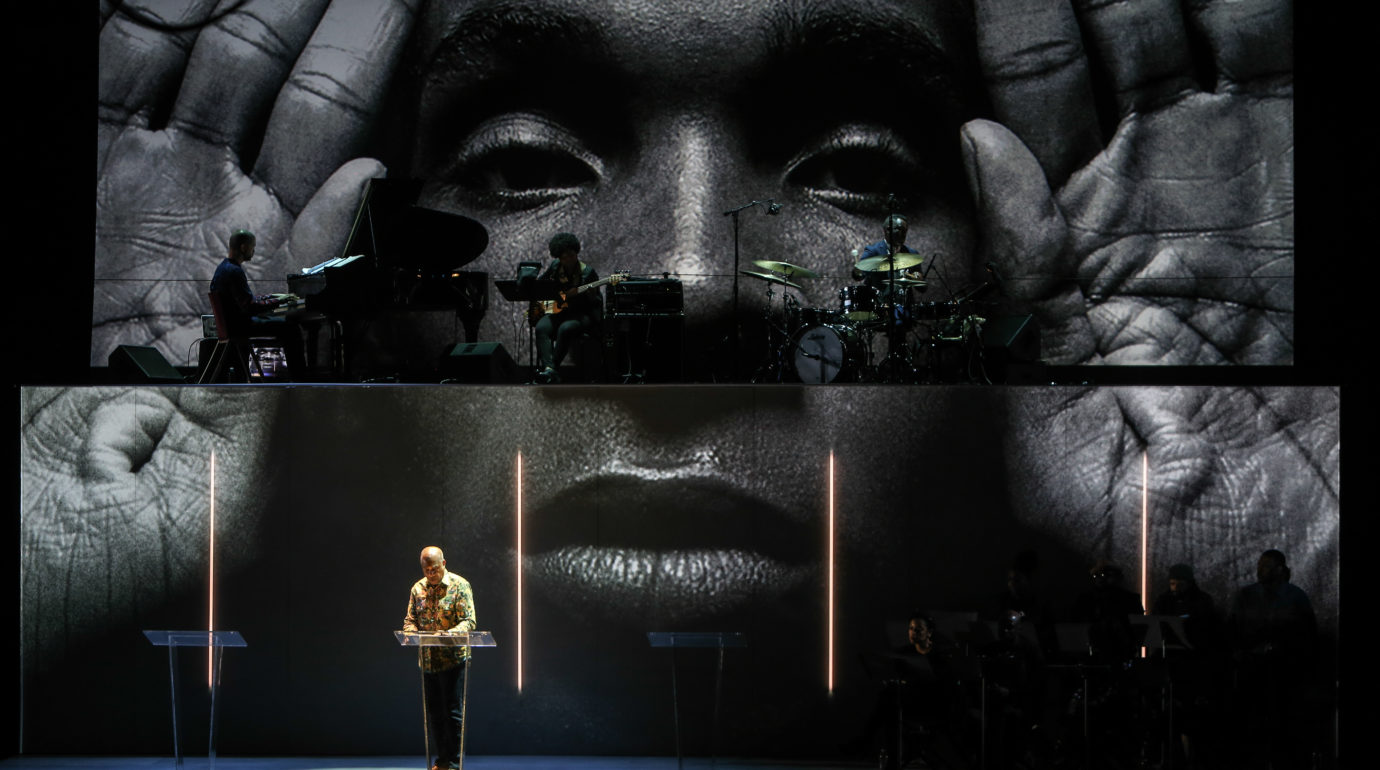Kamilah Forbes met Ta-Nehisi Coates in 1994 when they were both students at Howard University in Washington, D.C. Little did they know then that she would go on to become an award-winning theatre producer and director, and he would one day be among the most celebrated contemporary American writers. Though he was then a poet and a journalist for the Washington City Paper, Forbes says of her friend’s rise to prominence, “I didn’t expect that at all.”
When Forbes was named executive producer of Harlem’s Apollo Theater, one of the largest Black arts institutions in America, in 2016, one of the first things she did was call her long-time friend with question: Could she adapt his 2015 memoir Between the World and Me into a play? Forbes says she sees the book, written in the form of a letter from Coates to his son, it as “an amalgamation of his reporting, but also his poetic voice and nonfiction writing from all the years at The Atlantic.”
After a two-night run at the Apollo in 2018, followed by a showing at Kennedy Center in Washington, D.C., Forbes is bringing the staged version of Between the World and Me back to the Apollo as part of a nationwide tour. It runs for two performances on Oct. 22 at the Atlanta Symphony in Georgia, then at the Apollo Oct. 25-28. Other tour stops will be announced at a later date. Coates is also in residence at the Apollo for the next three seasons.
When Forbes first read Between the World and Me in 2015, she was struck by how simultaneously specific yet universal it was. Ostensibly addressed to his then-15-year-old son, Samori, the book traces the writer’s journey toward finding his voice and authentic place in the world, addressing along the way police brutality, systemic racism, and the fears he has as a father. “You are a Black boy,” he tells his son. “You must be responsible for your body in a way that other boys cannot know. You must be responsible for the worst actions of other Black bodies, which will always be assigned to you.” Between the World and Me won the National Book Award and was a Pulitzer Prize finalist, and it earned Coates a MacArthur “Genius” Award.
Forbes, who is also directing the play, had dramaturgs Lauren A. Whitehead and Talvin Wilks help her adapt Coates’s prose into a theatrical experience that could serve as a vessel for community conversation. “Book reading can be so solitary; we read our books by ourselves, and unless you’re part of a book club, do you really engage within the topics or in the actual writing or primarily the topic that the book discusses?” Forbes wonders. “The question was about how can we use theatre as this collective form of communication to have the broader conversation with the book.” She adds, “With this being such a timely conversation, it’s really sad how more timely it really becomes day by day.”
The play is structured as a series of scenes, sometimes in monologue, other times in dialogue. It also features projections and original music by fellow MacArthur “Genius” Jason Moran. Performers stand in front of a clear mic stand with a script in front of them. When Between the World and Me was mounted last year, it featured a star-studded cast: Angela Bassett, Common, and Tariq Trotter (a.k.a. Black Thought). Common also contributed an original song for the event. Coates was a reader for one evening. The performers for the return engagement include actor Marc Bamuthi Joseph, who also read last year, rapper Tip “T.I.” Harris, and Black Lives Matter co-founder Alicia Garza.
Since the book draws from Coates’s own life, there is a narrative propulsion to it. But Forbes does not want any of her actors to be playing him as a character. “It’s not about a cast inhabiting a character but a community embracing a conversation, and how do we make the community as broad as possible,” she explains.

This is Forbes’s third season at the Apollo, and with the remount of Between the World and Me, the theatre is launching a project called “our 21st century canon campaign.” Because the Apollo is opening a new performing arts complex in the fall of 2020, with two venues, one 99-seat and another 199-seats, Forbes sees the canon project as an opportunity for the long-running institution to shift from a presenting house to a producing one, and for its shows to have runs longer than a few nights. “It’s another opportunity to develop more work, to commission work, and be a catalyst of defining what the next generation of our canon will look like, with African American voices playing a very significant part at the center.”
It begins with Between the World and Me, which Forbes sees as a “call to action” for Harlem, one of the most heavily policed neighborhoods in New York City. “How are we responding to this senseless police killing and violence by police, particularly in the Black community, how are we taking action through non-violent measures, and making those standardized?” says Forbes. “What is the training for our police force around cultural sensitivity? Clearly in this community we see the inequity of policing; How do we bring the issue truly to the forefront and not just the kitchen tables of each of our private homes?”
At the same time, Between the World and Me book is about family and joy as much as it is about injustice, and Forbes likewise hopes to create a space for “healing” and “celebration,” to show that Black lives cannot be defined by oppression. Part of the piece is about “how to pass on lessons for survival,” she says, “and part of that survival is to celebrate. Part of that survival is to see the joy and humanity in who we are. That’s also part of the call to action.”


